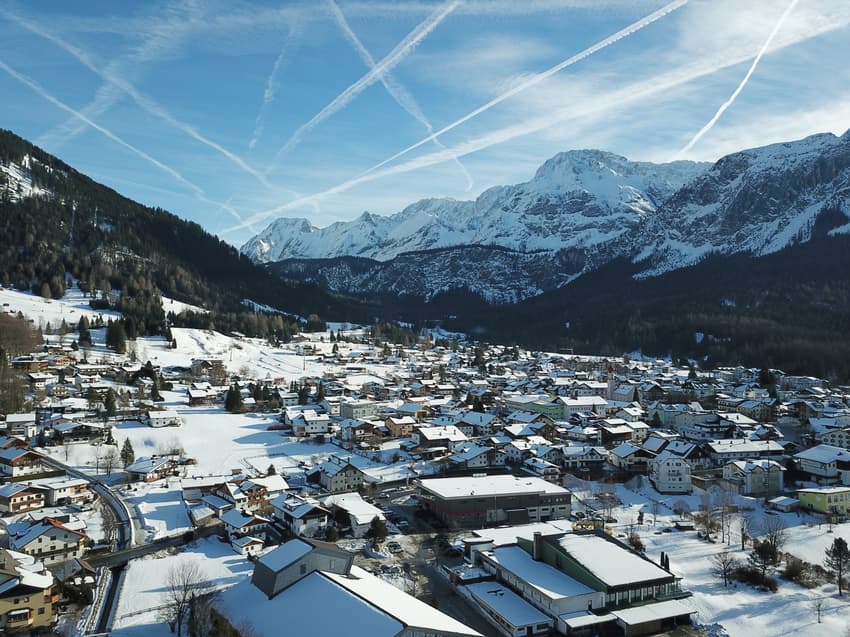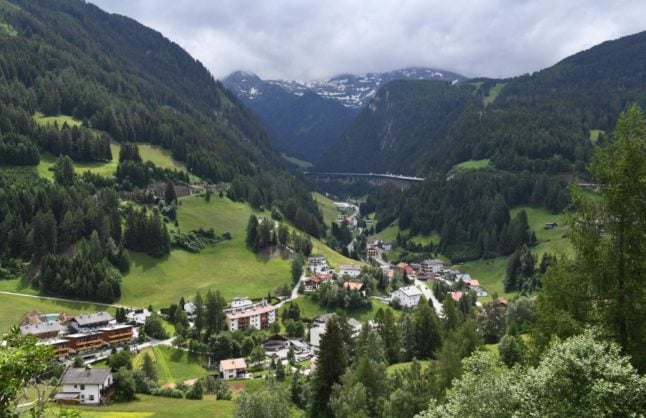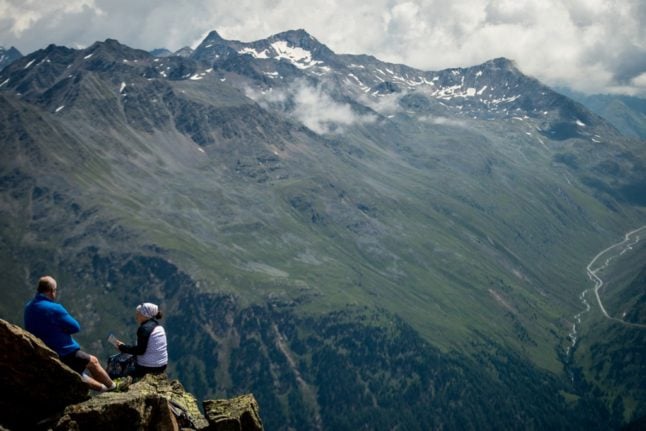What you need to know about finding work in Austrian towns and villages

Finding work is difficult. Finding a job in a new country is more complicated. Finding work in a rural community in a new country— now, that’s downright challenging. Here's how you can do it.
It's certainly not easy finding a job in a new country as an immigrant. And certain factors can influence your search a lot. For example, in Austria, things like whether or not you speak German, have a work permit, can commute or need full-time annual employment can make a huge difference when finding work. Especially if said work is away from major city centres such as Vienna.
You’ll land a job fastest if you speak German, have a work permit, and are flexible about where and how often you work. But the rural Austrian economy is struggling to find workers post-coronavirus so that tips the scale in favour of job seekers.
READ ALSO: LATEST: What is the job market in Austria like right now?
The Industries
While the Dorf contains the same industries as the Stadt, the companies are dispersed. The most common sectors for finding a job are Construction, Engineering, Retail, Tourism, and Hospitality.
For skilled and unskilled labourers, jobs in hospitality and tourism abound, especially if you’re willing to work seasonally like Alex, who’s Hungarian and lives near a Styrian ski resort.
She explained: “I heard from my Austrian partner that the ski resort team was missing a Seilbahnbedienstete (cable car attendant) as one worker decided not to return for the 2021/2022 winter season.
"I was worried about whether my language skills were sufficient for the position. And I had questions about the job since I don’t ski and have never set foot in a ski resort in winter! But the job sounded fairly easy, so I thought I’d try it!”
READ ALSO: Will a 4-day week and free German lessons help Vienna’s transport network find staff?
Alex got the job for winter but was worried about summer employment, as almost everything besides the main lift is shut down in the warmer months.
“I got kind of lucky. At the end of the ski season, someone quit at the main lift. I was offered a year-long contract if I was willing to keep working through summer.”, she said.
Alex’s story demonstrates the seasonality of work in Austria. If you’re willing to hustle bi-annually, you might be able to work your way into something permanent. And, as she demonstrates, you don’t need to be a skier or mountain biker to succeed on the slopes.
The Pay
Wages in the Dorf are lower than in the Stadt, partly because most families cohabitate and are landowners. Many people also produce their food in gardens and with domesticated animals, like cows and chickens. Subsidised childcare also keeps the cost of living low.
“This was a big deal to me,” said Alexis, a Dutch mom living in the Kaprun region. “I can work part-time because childcare here only costs 80 euros per month. In Holland, it was €800. So being able to work part-time opens up a lot of options.”
READ ALSO: ‘We need immigration’: Austrian minister insists foreign workers are the only solution
Plus, there are fewer ways to spend your money in the Dorf. Okay, your ski pass may be expensive, but you’re unlikely to spend money at the movies, restaurants, or other everyday city activities. So living in the Dorf might help you increase your savings, even with a lesser income.

A picture taken on June 8, 2018 shows a small village near the Brenner Pass (Brennerpass), the mountain pass through the Alps between Austria and Italy, close to the Austrian city of Innsbruck. (Photo by Christof STACHE / AFP)
A Closer Look
Now that we’ve covered the basics, here is more strategic advice based on your ability to speak German (or not) and your flexibility.
Sie sprechen Deutsch
The Dorf world is your oyster if you speak German. You can use traditional avenues to search for jobs, like LinkedIn, Glassdoor, Hokify, and Xing.
But speaking the language doesn’t mean the process will be easy. You’re still up against locals, many of whom have contacts (or parents) ready to offer a job. In addition to submitting your application, follow up with phone calls and in-person visits. Be sure to mention that you already live in the area. And it doesn’t hurt to say that you love Austria! The employer wants to believe that you’ll stay for the long run as they assume many foreigners will have looser ties to the country.
READ ALSO: Working in Austria: Why foreigners find it hard to integrate in the workplace
You don’t speak German
If you can barely say bitte, don’t fear— there’s likely work for you in hospitality, tourism, global corporations with Austrian offices or teaching English (or other languages).
Landing a job in hospitality or tourism without speaking German is more likely if you find an establishment that caters to Dutch, English, or international tourists.
Some Austrian resorts are the playground of only Germans and Austrians, so at least a basic German level would be expected for most positions.
The only way to know is by applying; HR will explain more about the clientele. Even in German-prevalent establishments, you should look for back-of-house positions, like housekeeping and gardening. You can “get your foot in the door” while your language skills increase.
READ ALSO: Six official websites to know if you’re planning to work in Austria
You’ll have the most options in a tourist town. Alison was surprised when German skills weren’t a barrier in Hochkönig: “My German is fairly basic, yet they were fine with me doing the Kassa at the swimming pool and the buffet. The bakery in the village takes quite a few staff who don't speak much German as the owners speak English themselves.”
Many global companies have headquarters in Austrian villages. Retail sports companies like Atomic, Red Bull, Blue Tomato, and Soloman are notable Dorf-dwellers. International construction and engineering companies, like Liebherr and Has-To-Be E-Mobility, are located in lesser-known places. All of these companies offer English-speaking positions.
READ ALSO: How to find a job in winter sports in Austria
Beware: even if the job description says “English-speaking,” your colleagues will likely speak German. Nay: they’ll speak the dialect. On the plus side, this offers you an opportunity to learn the language. On the downside, you may struggle to form social connections.
“The process for finding work isn’t too different,” said Andy, an American working in Altenmarkt. “But, it’s more difficult to find. Mostly because of the language: you usually have fewer international companies and expats to bring English to the company in the countryside.”
You don’t have a work permit
If you’ve landed in Austria looking for work but don’t have a permit, you better hustle. Unless you’re EEA or Swiss, you can’t stay longer than 180 days without a work permit. After that, you can apply for a job seeker’s visa but must meet highly-skilled worker criteria.
On the other hand, you may get a work permit through your employer if you’re highly skilled and the company cannot find anyone else to fill the position. Such circumstances are rare and usually negotiated BEFORE you arrive.
READ ALSO: How Austria is making it easier for non-EU workers to get residence permits
Austria allows a certain number of non-EEA immigrants to work under a quota system. Once the quota is reached, Austrian companies can only hire Austrian or "Austrian-equivalent" (EEA) staff. So if you’re already in-country, you might have an edge against applicants abroad. But if the quota is filled, you’re out of luck.

Hikers take a break on the top of the Gaislachkogl Mountain (3050m) in the Tyrol region in the heart of the Austrian Alps, on July 11, 2018. (Photo by VLADIMIR SIMICEK / AFP)
How far will you go?
Widen your net, and you’ll catch more fish! The neediest employers are the ones furthest from significant towns and villages. While Austrian public transportation is renowned, the ability to move between villages is limited. Many have a singular train station or bus stop, so you’ll need to walk or bike the rest of the way. And if you work in the mountains, you must schedule work based on the bus times. Driving makes you more flexible in the Dorf.
READ ALSO: When are the next public holidays in Austria?
However, many tourism and hospitality employers offer housing. If you enjoy isolation and don’t need a glamorous abode, look for hotels in the mountains. They’re the most likely to provide employee housing.
Finally, you might consider commuting to a larger city for work with private or public transport.
The Search
Finding a job in the Dorf can be tricky. Many of Austria’s rural jobs never touch online forums. Instead, they’re advertised via word-of-mouth. Having a personal introduction could be the golden ticket.
“I got my job because of a recommendation from a former employer. I suspect the manager only hired me because he was desperate and couldn't say no to the person who recommended me. The employer didn’t advertise the job on the usual job platforms like LinkedIn and Xing", said Sebi, an Indian immigrant who works in a small Styrian village.
READ ALSO: Everything you need to know about preparing your CV in Austria
It’s important to get personal in the Dorf.
After emailing a resume, give HR a follow-up call (use it as an opportunity to prove your German skills). Offer to buy a current employee a coffee in exchange for advice. Tell everyone in the neighbourhood that you’re searching for work. And use social media! Many smaller organisations post jobs on Facebook, Instagram, and TikTok.
Another idea: hop on your bicycle and explore. Mosey around different towns and check out the logos on buildings. Then, find their websites and social media to see if they’re hiring. Many companies allow you to submit resumes even if there are no open positions (look for Initiativbewerbung).

(AFP PHOTO / ALEXANDER KLEIN )
Sometimes, if they’re impressed by your experience and find your personality agreeable, they’ll create a place for you!
(PS: The Local also has a Job Board! Find it here: https://www.thelocal.at/jobs/)
READ ALSO: Working in Vienna: How to find a job in the Austrian capital
Form a Company
Without wading too deep into remote work, we note that international contract work is possible for Dorf-dwellers.
Alexis and her husband moved to the Kaprun area from Holland. They initially searched for Austrian work but couldn’t find anything suitable in the Dorf. So, they formed their own Austrian company, reconnected with their Dutch employers, and are now international contractors.
“Keep in mind that you need three contracts to start a company in Austria,” advises Alexis. “We have my contract, my husband’s contract, and I have a contract with someone I coach. Getting three contracts can be hard if you’re a single earner!”
Just Go For It!
There’s work for foreigners in the Dorf. It may take longer to find, be seasonal, or require a commute, but even without speaking German, the opportunities exist. And once you’re there, the living’s easy: fresh food, clean air, spacious apartments, and jolly locals.
Comments
See Also
It's certainly not easy finding a job in a new country as an immigrant. And certain factors can influence your search a lot. For example, in Austria, things like whether or not you speak German, have a work permit, can commute or need full-time annual employment can make a huge difference when finding work. Especially if said work is away from major city centres such as Vienna.
You’ll land a job fastest if you speak German, have a work permit, and are flexible about where and how often you work. But the rural Austrian economy is struggling to find workers post-coronavirus so that tips the scale in favour of job seekers.
READ ALSO: LATEST: What is the job market in Austria like right now?
The Industries
While the Dorf contains the same industries as the Stadt, the companies are dispersed. The most common sectors for finding a job are Construction, Engineering, Retail, Tourism, and Hospitality.
For skilled and unskilled labourers, jobs in hospitality and tourism abound, especially if you’re willing to work seasonally like Alex, who’s Hungarian and lives near a Styrian ski resort.
She explained: “I heard from my Austrian partner that the ski resort team was missing a Seilbahnbedienstete (cable car attendant) as one worker decided not to return for the 2021/2022 winter season.
"I was worried about whether my language skills were sufficient for the position. And I had questions about the job since I don’t ski and have never set foot in a ski resort in winter! But the job sounded fairly easy, so I thought I’d try it!”
READ ALSO: Will a 4-day week and free German lessons help Vienna’s transport network find staff?
Alex got the job for winter but was worried about summer employment, as almost everything besides the main lift is shut down in the warmer months.
“I got kind of lucky. At the end of the ski season, someone quit at the main lift. I was offered a year-long contract if I was willing to keep working through summer.”, she said.
Alex’s story demonstrates the seasonality of work in Austria. If you’re willing to hustle bi-annually, you might be able to work your way into something permanent. And, as she demonstrates, you don’t need to be a skier or mountain biker to succeed on the slopes.
The Pay
Wages in the Dorf are lower than in the Stadt, partly because most families cohabitate and are landowners. Many people also produce their food in gardens and with domesticated animals, like cows and chickens. Subsidised childcare also keeps the cost of living low.
“This was a big deal to me,” said Alexis, a Dutch mom living in the Kaprun region. “I can work part-time because childcare here only costs 80 euros per month. In Holland, it was €800. So being able to work part-time opens up a lot of options.”
READ ALSO: ‘We need immigration’: Austrian minister insists foreign workers are the only solution
Plus, there are fewer ways to spend your money in the Dorf. Okay, your ski pass may be expensive, but you’re unlikely to spend money at the movies, restaurants, or other everyday city activities. So living in the Dorf might help you increase your savings, even with a lesser income.

A Closer Look
Now that we’ve covered the basics, here is more strategic advice based on your ability to speak German (or not) and your flexibility.
Sie sprechen Deutsch
The Dorf world is your oyster if you speak German. You can use traditional avenues to search for jobs, like LinkedIn, Glassdoor, Hokify, and Xing.
But speaking the language doesn’t mean the process will be easy. You’re still up against locals, many of whom have contacts (or parents) ready to offer a job. In addition to submitting your application, follow up with phone calls and in-person visits. Be sure to mention that you already live in the area. And it doesn’t hurt to say that you love Austria! The employer wants to believe that you’ll stay for the long run as they assume many foreigners will have looser ties to the country.
READ ALSO: Working in Austria: Why foreigners find it hard to integrate in the workplace
You don’t speak German
If you can barely say bitte, don’t fear— there’s likely work for you in hospitality, tourism, global corporations with Austrian offices or teaching English (or other languages).
Landing a job in hospitality or tourism without speaking German is more likely if you find an establishment that caters to Dutch, English, or international tourists.
Some Austrian resorts are the playground of only Germans and Austrians, so at least a basic German level would be expected for most positions.
The only way to know is by applying; HR will explain more about the clientele. Even in German-prevalent establishments, you should look for back-of-house positions, like housekeeping and gardening. You can “get your foot in the door” while your language skills increase.
READ ALSO: Six official websites to know if you’re planning to work in Austria
You’ll have the most options in a tourist town. Alison was surprised when German skills weren’t a barrier in Hochkönig: “My German is fairly basic, yet they were fine with me doing the Kassa at the swimming pool and the buffet. The bakery in the village takes quite a few staff who don't speak much German as the owners speak English themselves.”
Many global companies have headquarters in Austrian villages. Retail sports companies like Atomic, Red Bull, Blue Tomato, and Soloman are notable Dorf-dwellers. International construction and engineering companies, like Liebherr and Has-To-Be E-Mobility, are located in lesser-known places. All of these companies offer English-speaking positions.
READ ALSO: How to find a job in winter sports in Austria
Beware: even if the job description says “English-speaking,” your colleagues will likely speak German. Nay: they’ll speak the dialect. On the plus side, this offers you an opportunity to learn the language. On the downside, you may struggle to form social connections.
“The process for finding work isn’t too different,” said Andy, an American working in Altenmarkt. “But, it’s more difficult to find. Mostly because of the language: you usually have fewer international companies and expats to bring English to the company in the countryside.”
You don’t have a work permit
If you’ve landed in Austria looking for work but don’t have a permit, you better hustle. Unless you’re EEA or Swiss, you can’t stay longer than 180 days without a work permit. After that, you can apply for a job seeker’s visa but must meet highly-skilled worker criteria.
On the other hand, you may get a work permit through your employer if you’re highly skilled and the company cannot find anyone else to fill the position. Such circumstances are rare and usually negotiated BEFORE you arrive.
READ ALSO: How Austria is making it easier for non-EU workers to get residence permits
Austria allows a certain number of non-EEA immigrants to work under a quota system. Once the quota is reached, Austrian companies can only hire Austrian or "Austrian-equivalent" (EEA) staff. So if you’re already in-country, you might have an edge against applicants abroad. But if the quota is filled, you’re out of luck.

How far will you go?
Widen your net, and you’ll catch more fish! The neediest employers are the ones furthest from significant towns and villages. While Austrian public transportation is renowned, the ability to move between villages is limited. Many have a singular train station or bus stop, so you’ll need to walk or bike the rest of the way. And if you work in the mountains, you must schedule work based on the bus times. Driving makes you more flexible in the Dorf.
READ ALSO: When are the next public holidays in Austria?
However, many tourism and hospitality employers offer housing. If you enjoy isolation and don’t need a glamorous abode, look for hotels in the mountains. They’re the most likely to provide employee housing.
Finally, you might consider commuting to a larger city for work with private or public transport.
The Search
Finding a job in the Dorf can be tricky. Many of Austria’s rural jobs never touch online forums. Instead, they’re advertised via word-of-mouth. Having a personal introduction could be the golden ticket.
“I got my job because of a recommendation from a former employer. I suspect the manager only hired me because he was desperate and couldn't say no to the person who recommended me. The employer didn’t advertise the job on the usual job platforms like LinkedIn and Xing", said Sebi, an Indian immigrant who works in a small Styrian village.
READ ALSO: Everything you need to know about preparing your CV in Austria
It’s important to get personal in the Dorf.
After emailing a resume, give HR a follow-up call (use it as an opportunity to prove your German skills). Offer to buy a current employee a coffee in exchange for advice. Tell everyone in the neighbourhood that you’re searching for work. And use social media! Many smaller organisations post jobs on Facebook, Instagram, and TikTok.
Another idea: hop on your bicycle and explore. Mosey around different towns and check out the logos on buildings. Then, find their websites and social media to see if they’re hiring. Many companies allow you to submit resumes even if there are no open positions (look for Initiativbewerbung).

Sometimes, if they’re impressed by your experience and find your personality agreeable, they’ll create a place for you!
(PS: The Local also has a Job Board! Find it here: https://www.thelocal.at/jobs/)
READ ALSO: Working in Vienna: How to find a job in the Austrian capital
Form a Company
Without wading too deep into remote work, we note that international contract work is possible for Dorf-dwellers.
Alexis and her husband moved to the Kaprun area from Holland. They initially searched for Austrian work but couldn’t find anything suitable in the Dorf. So, they formed their own Austrian company, reconnected with their Dutch employers, and are now international contractors.
“Keep in mind that you need three contracts to start a company in Austria,” advises Alexis. “We have my contract, my husband’s contract, and I have a contract with someone I coach. Getting three contracts can be hard if you’re a single earner!”
Just Go For It!
There’s work for foreigners in the Dorf. It may take longer to find, be seasonal, or require a commute, but even without speaking German, the opportunities exist. And once you’re there, the living’s easy: fresh food, clean air, spacious apartments, and jolly locals.
Join the conversation in our comments section below. Share your own views and experience and if you have a question or suggestion for our journalists then email us at [email protected].
Please keep comments civil, constructive and on topic – and make sure to read our terms of use before getting involved.
Please log in here to leave a comment.